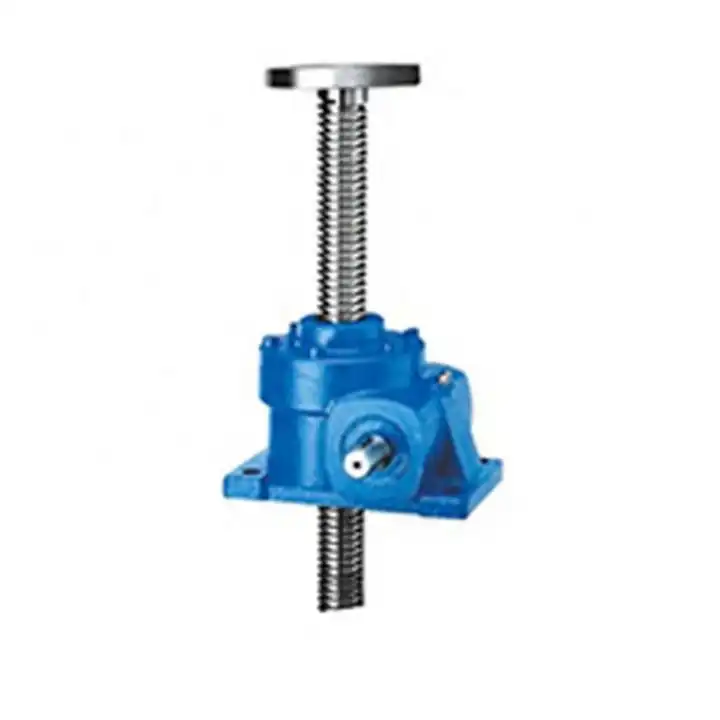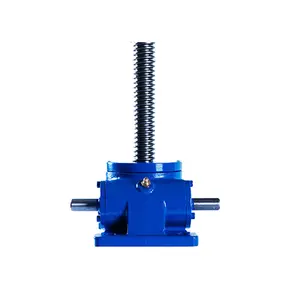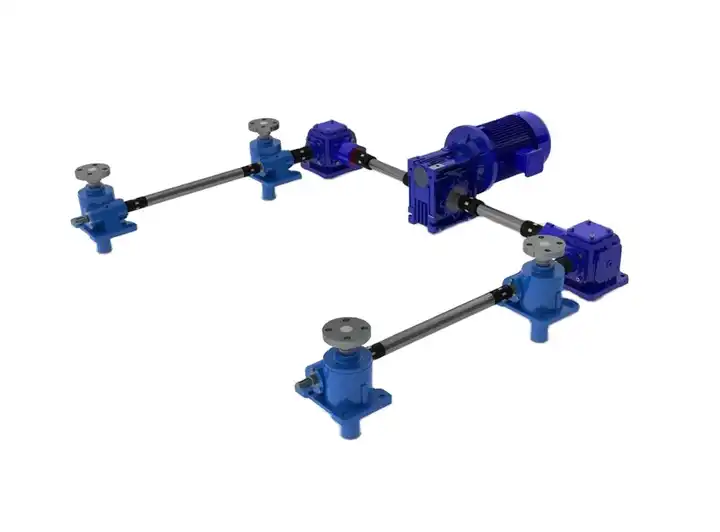Can screw jacks be used in conjunction with manual or motorized operation?
Yes, screw jacks can be used in conjunction with both manual and motorized operation, providing flexibility and adaptability to various applications. Screw jacks are versatile devices that can be powered by either human effort or motorized systems. Here’s how screw jacks can be utilized with manual and motorized operation:
- Manual Operation: Screw jacks can be operated manually by applying force to the input shaft or using a handwheel. This manual operation allows for precise control over the lifting or lowering process. It is commonly used in applications where the load is relatively light, adjustments need to be made incrementally, or where power sources may not be readily available. Manual operation provides simplicity, ease of use, and cost-effectiveness.
- Motorized Operation: Screw jacks can also be motorized for automated and efficient operation. Electric motors or hydraulic systems can be integrated with screw jacks to provide power-assisted lifting or lowering. Motorized operation offers advantages such as increased speed, higher lifting capacities, and the ability to handle heavier loads. It is particularly useful in applications where repetitive or frequent adjustments are required, or where large loads need to be lifted or positioned quickly.
- Combination of Manual and Motorized Operation: In certain applications, screw jacks can be used in combination with both manual and motorized operation. This hybrid approach provides the benefits of manual control for fine adjustments and motorized power for heavier lifting or faster operation. For example, a manual handwheel can be used for initial positioning or precise adjustments, while an electric motor can be engaged for larger-scale movements or when power assistance is needed. This combination allows for versatility and adaptability to different load requirements and operating conditions.
The choice between manual and motorized operation depends on factors such as the nature of the application, load requirements, desired speed, available power sources, and operator preferences. Screw jacks offer the flexibility to switch between manual and motorized operation, making them suitable for a wide range of industries and applications, including manufacturing, construction, automotive, and entertainment.
How do screw jacks enhance the performance of lifting and leveling applications?
Screw jacks are versatile mechanical devices that enhance the performance of lifting and leveling applications in several ways. Here are some ways in which screw jacks contribute to improved performance:
- Precise Positioning: Screw jacks offer precise positioning control, allowing for accurate adjustment of height or level. The threaded screw mechanism provides fine incremental movements, enabling operators to achieve the desired position with high precision. This level of control is crucial in applications where precise alignment, leveling, or height adjustment is required.
- Heavy Load Capacity: Screw jacks are capable of lifting and supporting heavy loads. They are designed to handle substantial weight and provide reliable load-bearing capabilities. The mechanical advantage of the screw thread allows for efficient transfer of force, enabling screw jacks to handle loads that would be impractical or challenging for other lifting mechanisms.
- Stability and Safety: Screw jacks offer stability and safety during lifting and leveling operations. The threaded screw mechanism ensures that the load remains secure and stable in the desired position, minimizing the risk of accidental movement or shifting. Screw jacks are designed with safety features such as locking mechanisms or braking systems to prevent unintended lowering or sudden movements, enhancing overall safety for both operators and the lifted load.
- Adjustability and Flexibility: Screw jacks provide adjustability and flexibility in lifting and leveling applications. They can be easily adjusted to accommodate different heights or levels, making them suitable for a wide range of applications. Screw jacks are available in various sizes, load capacities, and configurations, allowing for customization and adaptation to specific requirements.
- Reliability and Durability: Screw jacks are known for their reliability and durability. They are constructed with robust materials and designed to withstand heavy loads, frequent use, and harsh operating conditions. The screw thread mechanism is inherently resistant to wear and provides excellent load-holding capabilities, ensuring long-term performance and reliability.
- Manual or Motorized Operation: Screw jacks can be operated manually or with motorized systems, providing flexibility in choosing the appropriate mode of operation based on the specific application. Manual screw jacks are often used when precise control is required, while motorized screw jacks offer increased speed and automation for lifting or leveling larger or heavier loads.
By offering precise positioning, high load capacity, stability, adjustability, reliability, and flexibility in operation, screw jacks significantly enhance the performance of lifting and leveling applications. Their versatility and ability to handle heavy loads make them a preferred choice in various industries where controlled lifting, leveling, or positioning is essential.
How do manufacturers ensure the quality and reliability of screw jack mechanisms?
Manufacturers employ various quality control and testing measures to ensure the quality and reliability of screw jack mechanisms. These measures are implemented throughout the manufacturing process to verify that the screw jack meets the required standards and performance specifications. Here are some common practices manufacturers use to ensure quality and reliability:
- Design and Engineering: Manufacturers invest in robust design and engineering processes to develop screw jack mechanisms that meet the intended specifications. This includes selecting appropriate materials, determining the optimal thread design, and performing structural analysis to ensure the screw jack can handle the expected loads and movements. Thorough design and engineering processes contribute to the overall quality and reliability of the mechanism.
- Material Selection: Manufacturers carefully select materials with the necessary strength, durability, and corrosion resistance for the construction of screw jack mechanisms. High-quality materials, such as alloy steels or stainless steels, are often chosen to ensure the longevity and reliability of the screw jack. Material selection is based on factors such as load requirements, environmental conditions, and industry standards.
- Quality Assurance: Manufacturers implement comprehensive quality assurance processes to monitor and control the manufacturing steps. These processes include inspections, audits, and documentation to ensure that each screw jack meets the specified quality standards. Quality assurance measures may involve checks for dimensional accuracy, thread quality, surface finish, and proper assembly. Through quality assurance, manufacturers can identify and address any potential defects or deviations from the desired specifications.
- Testing and Performance Evaluation: Manufacturers conduct rigorous testing and performance evaluations to verify the functionality, load capacity, and reliability of screw jack mechanisms. This may involve load testing, endurance testing, and cycling tests to simulate real-world operating conditions. Testing helps validate the performance of the screw jack and ensures that it can handle the intended loads and movements without failure or significant degradation over time.
- Compliance with Standards: Manufacturers ensure that screw jack mechanisms comply with relevant industry standards and regulations. Compliance with standards such as ISO (International Organization for Standardization) or specific industry standards provides assurance of the quality and reliability of the product. Manufacturers may obtain certifications or undergo third-party audits to validate compliance with these standards.
- Customer Feedback and Continuous Improvement: Manufacturers value customer feedback and use it to drive continuous improvement in the design, manufacturing, and performance of screw jack mechanisms. By actively seeking input from customers and end-users, manufacturers can identify areas for enhancement and implement changes to improve the quality and reliability of their products.
By implementing stringent design processes, careful material selection, thorough quality assurance, testing and performance evaluation, compliance with standards, and continuous improvement practices, manufacturers ensure the quality and reliability of screw jack mechanisms. These measures help deliver screw jacks that meet the industry’s expectations for performance, safety, and durability.
editor by CX 2024-03-28




